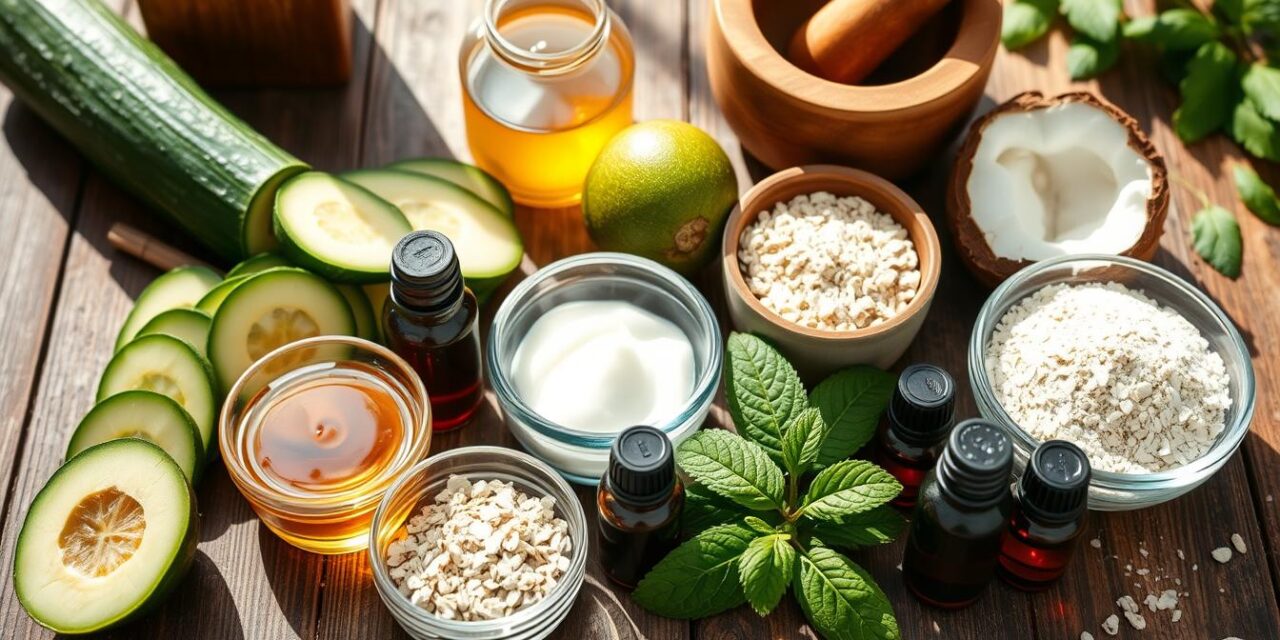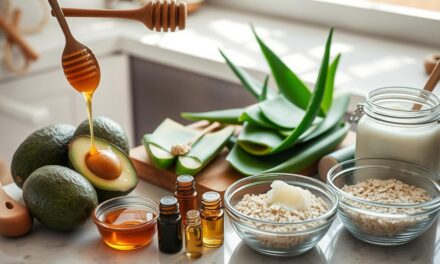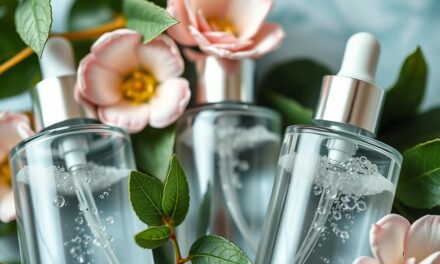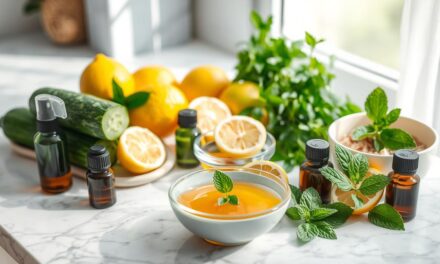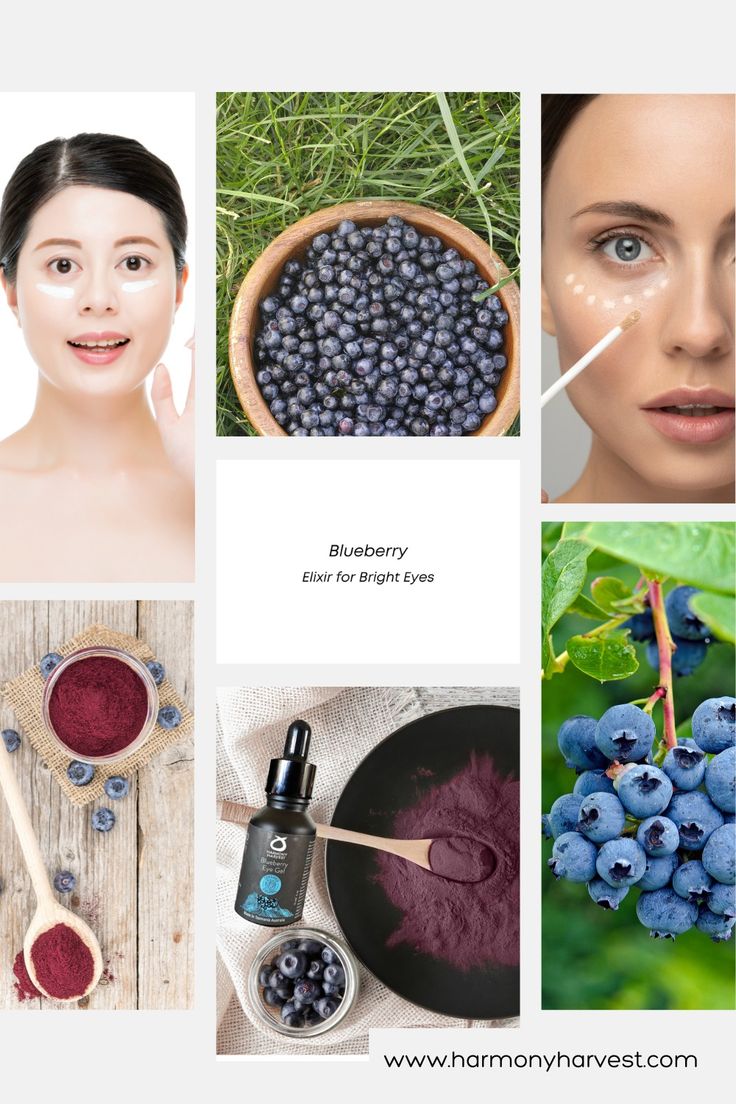Did you know the average Australian woman spends over $3,000 a year on skincare? But, the secret to glowing skin might be in your kitchen. Find out how to make a natural skincare routine with easy, cheap ingredients from your pantry.
Key Takeaways
- Embrace a natural, cost-effective approach to skincare with kitchen-based ingredients
- Learn about the benefits of natural, homemade skincare solutions
- Discover essential kitchen staples that can be transformed into effective beauty products
- Develop a personalised morning, evening, and weekly skincare routine using natural ingredients
- Explore natural cleansers, exfoliators, facial masks, and moisturisers for all skin types
Understanding the Benefits of Kitchen-Based Skincare
Using organic skincare products and skin-nourishing foods can greatly benefit your skin. Natural ingredients from your kitchen offer a cost-effective, eco-friendly, and personalized skincare routine. Learn how these kitchen solutions can improve your skin’s health and glow.
Cost-Effective Beauty Solutions
Organic skincare products can be expensive, but your kitchen has many affordable, effective ingredients. Honey, aloe vera, oatmeal, and coconut oil are just a few examples. Making your own skincare products can save you money without sacrificing quality or results.
Environmental Impact of Natural Ingredients
Many skincare products contain synthetic chemicals harmful to the environment. In contrast, ingredients like essential oils, plant-based oils, and fruit extracts are sustainable and biodegradable. Choosing natural skincare not only benefits your skin but also reduces your environmental impact.
Safety and Skin Compatibility
Commercial skincare products can irritate sensitive skin or cause reactions. Opting for organic skincare made from kitchen ingredients ensures your routine is gentle and safe. Natural ingredients are less likely to cause sensitivity, making them perfect for sensitive skin.
“The beauty of kitchen-based skincare lies in its ability to nourish your skin with pure, organic ingredients that work in harmony with your complexion.” – Skincare Expert, Sarah Wilson
Adding kitchen-based skincare to your routine can be a game-changer. It offers a cost-effective, eco-friendly, and skin-friendly way to achieve radiant, healthy skin.
Essential Kitchen Ingredients for Natural Skincare
Looking for radiant, healthy skin? It might be in your kitchen. Many common ingredients have amazing benefits for your skin. They can be used in homemade face masks and natural skincare products.
Honey is a skin superstar. It locks in moisture and soothes acne and irritation. This golden nectar is a natural humectant.
Oats are great for more than breakfast. They soothe and calm the skin. Oats also gently exfoliate, removing dead skin cells.
- Yoghurt is full of probiotics, good for the skin’s health. It gently exfoliates with lactic acid.
- Avocado adds creaminess to face masks. It’s rich in healthy fats and vitamins A, C, and E.
- Oils like olive, coconut, and almond are perfect for skincare. They moisturise and protect the skin.
Next time, use these kitchen ingredients for a natural face mask. Your skin will love it!
Creating Your Skincare Routine with Kitchen Ingredients
Making an skincare routine with kitchen items is easy and budget-friendly. It lets you use common pantry items to create a personalized skincare routine for your skin. Here’s how to start your own skincare routine with kitchen ingredients.
Morning Routine Steps
Begin your day with a gentle face wash. Use honey, oatmeal, or aloe vera. Then, use a toner like rosewater or green tea to balance your skin’s pH. Finish with a moisturizer, like one made with avocado or coconut oil.
Evening Routine Components
Evening starts with removing makeup or dirt with olive oil or micellar water. Cleanse your skin again with a scrub of baking soda, sugar, or oats. End with a hydrating face mask, like one with honey, yogurt, or mashed banana.
Weekly Treatment Schedule
- Try a homemade facial steam once a week. Use herbs like chamomile or lavender to open pores and brighten your skin.
- Add a DIY face oil to your routine 2-3 times a week. Mix it with essential oils like rosehip or argan for extra moisture.
- Use a gentle exfoliating mask once a week. Make it with clay, coffee, or oats to remove dead skin and improve your skin’s look.
By using this effective skincare routine with kitchen ingredients, you’ll get healthier, brighter skin. Let nature work for you and feel confident with your natural skincare.
Natural Cleansers from Your Pantry
Your kitchen is full of skin-nourishing ingredients for DIY beauty and natural skincare. Making your own cleansers with pantry items is easy and cheap. It can make your skincare routine better.
The honey cleanser is a great choice. Honey is good for all skin types because it fights bacteria and keeps moisture. Mix equal parts raw honey and warm water until it’s creamy. Massage it on damp skin and then rinse well.
For a deeper clean, try a baking soda and lemon juice cleanser. Baking soda gently scrubs and opens up pores. Lemon juice brightens and balances the skin. Mix one teaspoon of baking soda with half a lemon’s juice. Apply it to your face, but avoid the eyes.
“Homemade cleansers are a game-changer for anyone seeking a more natural and cost-effective approach to skincare.”
The oatmeal and aloe vera cleanser is also simple yet effective. Oats gently remove dead skin, and aloe vera soothes and hydrates. Mix one cup of oats with a quarter cup of aloe vera gel. Use it to clean your face.
Adding natural cleansers from your pantry can change your DIY beauty routine. Try these kitchen-based solutions to find the best natural skincare for your skin.

Homemade Exfoliators and Scrubs
Exfoliation is key in natural skincare, removing dead skin cells to show off the glowing skin underneath. You can make your own exfoliators and scrubs with kitchen items. These DIY beauty hacks are affordable and organic, helping you get healthy, glowing skin.
Gentle Exfoliating Options
For sensitive skin, a gentle scrub is best. Mix oatmeal, honey, and warm water for a soothing exfoliant. The oats gently remove impurities, and honey hydrates and fights bacteria.
Deep Cleansing Scrub Recipes
For a deep clean, use scrubs with baking soda, brown sugar, and coconut oil. These ingredients clear pores and brighten your skin. Add lemon or peppermint essential oils for a spa-like feel.
Frequency of Exfoliation
- Sensitive skin types: 1-2 times per week
- Normal/combination skin: 2-3 times per week
- Oily/acne-prone skin: 3-4 times per week
Listen to your skin and adjust exfoliation frequency. Too much can cause irritation and dryness. Start gentle and increase as needed.
“Exfoliation is the key to unlocking a more radiant, youthful complexion. With these simple DIY scrubs, you can achieve salon-worthy results from the comfort of your own kitchen.”
Kitchen-Based Facial Masks and Treatments
Discover the secrets of natural skincare in your kitchen. Find homemade face masks and treatments using everyday ingredients. These solutions nourish and rejuvenate your skin, making it radiant and healthy.
Nourishing Avocado and Honey Mask
Avocado is full of nutrients good for your skin. Honey keeps moisture in. Mix half an avocado with a tablespoon of honey and apply to your face. Leave it on for 15-20 minutes for a glow.
Clarifying Clay and Oatmeal Mask
Bentonite clay removes impurities and excess oil. Mix a tablespoon of clay with oatmeal and water to make a paste. Apply and leave for 10-15 minutes for a deep clean.
Brightening Turmeric and Yogurt Mask
Turmeric brightens your skin. Yogurt exfoliates and soothes. Mix turmeric powder with yogurt and apply. Leave for 20 minutes for a radiant look.
| Mask | Key Ingredients | Benefits |
|---|---|---|
| Avocado and Honey Mask | Avocado, Honey | Nourishing, Moisturizing |
| Clay and Oatmeal Mask | Bentonite Clay, Oatmeal | Clarifying, Deep Cleansing |
| Turmeric and Yogurt Mask | Turmeric, Yogurt | Brightening, Exfoliating |
Add these homemade masks to your skincare routine. Enjoy a spa-like experience at home. Your skin will thank you.
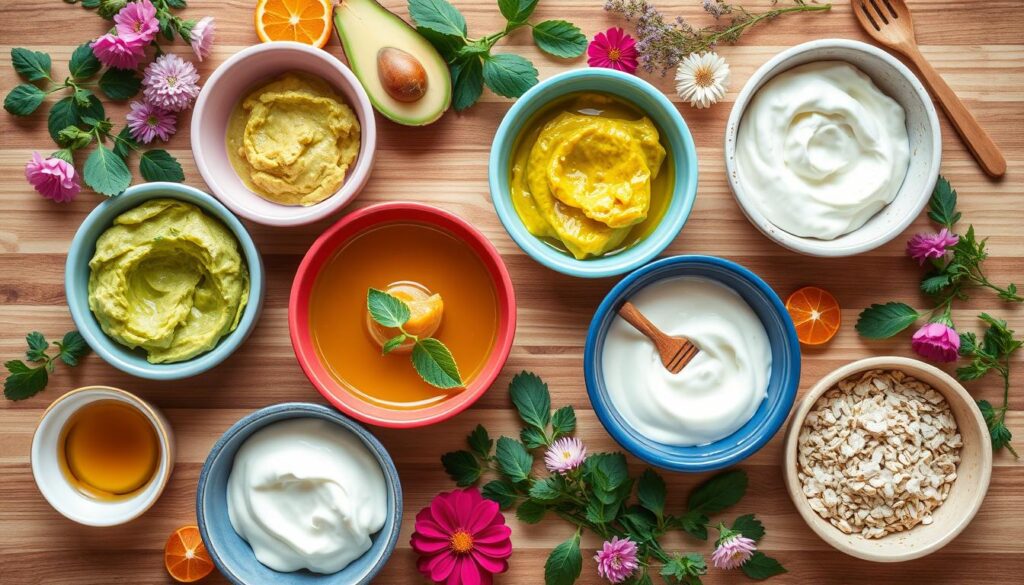
Natural Moisturisers and Hydrating Solutions
Getting a healthy, glowing skin starts with a good skincare routine. Your kitchen is full of natural products that can hydrate and brighten your skin.
Dry Skin Solutions
For dry skin, try avocado, coconut oil, and honey. Avocado’s fatty acids deeply nourish. Coconut oil seals in moisture. Honey draws water into your skin, keeping it hydrated.
Oily Skin Balancing Acts
If you have oily skin, aloe vera, green tea, and lemon are great. Aloe vera is light and hydrates without clogging pores. Green tea controls oil, and lemon tightens pores.
Combination Skin Care
For combination skin, mix jojoba oil, rose water, and raw honey. Jojoba oil hydrates without oiliness. Rose water balances, and honey nourishes and protects.
Using these natural ingredients in your skincare routine is affordable and eco-friendly. They work for all skin types, making your skin radiant and hydrated.
Targeting Specific Skin Concerns Naturally
Looking for radiant, healthy skin? It’s key to tackle specific skin issues with natural remedies. Kitchen-based skincare can offer great, non-invasive options for acne, ageing, and hyperpigmentation.
Tackling Acne Naturally
Acne can be tough, but natural ingredients like tea tree oil, green tea, and manuka honey can help. They have antibacterial and anti-inflammatory properties. Try mixing manuka honey, bentonite clay, and tea tree oil for a simple acne mask.
Combating Ageing Skin
Ageing skin benefits from avocado, coconut oil, and aloe vera. These ingredients are rich in antioxidants and hydrate well. Blend them into a face mask to plump and smooth out wrinkles. Add ground oats for gentle exfoliation.
Fading Hyperpigmentation
Lemon juice, turmeric, and raw honey can lighten dark spots. Mix these into a paste and apply to dark areas. Let it sit for 10-15 minutes before rinsing.
Using kitchen-based natural skincare can tackle many skin issues. Embrace these beauty hacks for a glowing complexion.
Storage and Shelf Life of Homemade Skincare Products
DIY beauty and homemade face masks need proper storage to last long. Knowing how to store your creations is crucial. It helps keep them fresh and effective.
Proper Storage Methods
Keep your homemade skincare in airtight containers. Use glass jars or BPA-free plastic bottles. This stops contamination and keeps ingredients fresh.
Don’t let your products sit in direct sunlight or hot places. Sunlight and heat can damage the natural ingredients.
Signs of Product Spoilage
Check your DIY beauty products often for spoilage signs. Look for colour, consistency, or smell changes. These can mean the product has gone bad.
If you see mold, discolouration, or a bad smell, throw it away. It’s not safe for your skin.
Preservation Techniques
- Add natural preservatives like essential oils. Tea tree or lavender can help.
- Keep your skincare in the fridge. It slows down bacteria growth.
- Make small batches. This way, you use them before they spoil.
Follow these tips to keep your homemade skincare fresh and safe. A good DIY beauty routine balances natural ingredients and proper care.
Common Mistakes to Avoid in DIY Skincare
Making your own skincare at home can save money and be rewarding. But, it’s important to watch out for mistakes that can harm your skin. Knowing what to avoid helps you make a skincare routine that really works.
One big mistake is using too much of strong ingredients. Natural things like essential oils and acids are good, but too much can dry out or irritate your skin. Finding the right amount is crucial for healthy, glowing skin.
- Avoid using too many active ingredients in a single product or routine.
- Be cautious with highly concentrated forms of ingredients like retinol or vitamin C.
- Gradually introduce new products and monitor your skin’s response.
Also, how you mix your ingredients is important. If you don’t mix well, your products might not work right. This can lead to uneven results.
- Invest in the right tools, such as a high-quality blender or whisk, to ensure proper emulsification.
- Follow precise measurements and mixing instructions for each recipe.
- Properly store your DIY products to maintain their potency and prevent contamination.
Lastly, don’t skip the patch test. It’s a must before using any new product. This test helps you see if your skin will react badly.
“Proper ingredient selection, preparation, and testing are the keys to creating safe and effective DIY skincare products.”
By avoiding these common mistakes, you can make natural skincare that really works for you. You’ll enjoy the benefits of using kitchen ingredients and solve your skin problems.
Conclusion
Discovering the power of natural ingredients from your kitchen can change your skincare game. By using natural skincare solutions, you get affordable, eco-friendly, and skin-friendly beauty treatments at home.
Adding kitchen ingredients for skin to your daily routine offers many benefits. It can deep clean, gently exfoliate, hydrate, and solve specific skin problems. With a bit of creativity and trying out different things, you can make a effective skincare routine that fits your skin perfectly.
Consistency is crucial for healthy, glowing skin. Keep up with your homemade skincare routines. You’ll be on your way to the natural, radiant look you’ve always wanted. Use your kitchen’s power to get beautiful, nourished skin.
